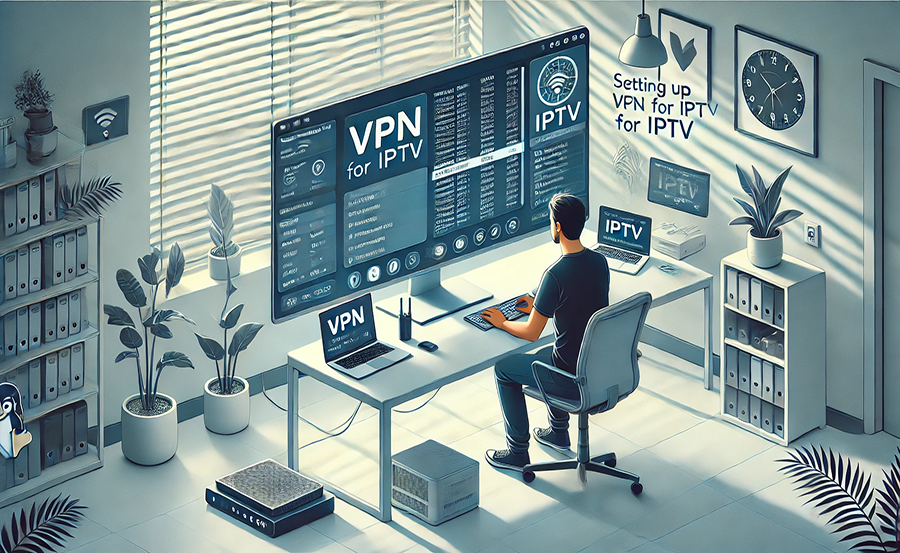In today’s swiftly evolving digital landscape, the manner in which we consume media is constantly changing. IPTV, or Internet Protocol Television, is at the forefront of this media revolution, offering an innovative way to access a plethora of channels and content globally. But, while IPTV is convenient, it’s not without its challenges, especially concerning privacy and access. This is where a VPN can enhance your TV experience profoundly. In this article, we’ll explore how using a VPN on Linux can significantly boost your IPTV subscription.
Understanding IPTV in a Nutshell
Before we dive into the benefits of using a VPN, let’s first understand what IPTV is all about. Unlike traditional cable or satellite TV, IPTV relies on internet protocol to deliver television content. This shift in the method of delivery opens up a world of opportunities for viewers; from accessing international channels to experiencing the flexibility of on-demand services. It’s a game-changer for those seeking variety and convenience.
For beginners stepping into the IPTV world, it’s crucial to grasp the fundamentals. Unlike the conventional TV experience, IPTV uses IP technology, allowing media content to be streamed to computers, smart TVs, and smartphones. This means that broadcasters aren’t limited to any particular region, which can considerably enhance your viewing pleasure.
Smart Advice:
Secure your entertainment for a full year with a 1 Year IPTV Subscription, offering uninterrupted access to live TV.
IPTV: The Growing Giant in Home Entertainment
The surge in IPTV services can be attributed to its adaptability and user-friendly features. With an IPTV subscription, audiences can enjoy a custom-tailored viewing schedule, setting preferences based on genre, interest, or even mood. Moreover, IPTV offers content across various devices seamlessly, which is particularly valued in our on-the-go lifestyles.
However, as IPTV continues to grow in popularity, it’s accompanied by certain pitfalls. Content geoblocking, quality inconsistency, and privacy issues are just a few challenges that users might face. Thus, understanding these hurdles is the first step in navigating and fully enjoying your IPTV service.
A Brief Look at Linux for IPTV Users
Linux, appreciated for its open-source flexibility, is a favorite among tech enthusiasts. As a robust operating system, it offers superior customizability and security, which are critical for IPTV users looking to optimize their streaming experience.
Despite being less mainstream compared to Windows or macOS, Linux offers significant advantages in stability and performance. Its lightweight nature ensures more resources are dedicated to delivering smoother streaming experiences, which is paramount to avoid potential disruptions during high-quality broadcasts.
VPNs on Linux: A Game Changer for IPTV Subscribers
Now that we’ve established a fundamental understanding of IPTV and its interaction with Linux, let’s pivot towards the role VPNs play in this ecosystem. Simply put, a Virtual Private Network (VPN) encrypts your internet traffic, thus providing a protective barrier against prying eyes.
When you use a VPN service with your IPTV system on Linux, you not only secure your connection but also bypass geographical restrictions. Thus, you gain access to a wider range of content that could otherwise be restricted based on your physical location.
Safeguarding Your Streaming Experience
Privacy in the digital age is paramount. When using IPTV, your internet activity could be logged and monitored. A VPN shields your activity from potential snoopers, including ISPs and other third-party entities that might seek to exploit your data for marketing purposes.
Moreover, cyber threats are a genuine concern. Malware and phishing attacks can infiltrate through unsecured networks. A VPN provides an additional layer of defense, significantly reducing the risk of data breaches or unauthorized access to your personal information.
Overcoming Geographical Limitations
One of the allures of IPTV is its global content access. However, not all content is always accessible due to licensing agreements and geoblocking. This is where a VPN truly shines. By masking your IP, a VPN allows you to appear as if you’re browsing from a different location, thus unlocking otherwise restricted channels and programs.
This is particularly beneficial for expatriates or multicultural families who want to enjoy content from their home country. With a VPN, their IPTV subscription is transformed into a tool that bridges cultural distances right from the comfort of their living rooms.
Choosing the Right VPN for Your IPTV and Linux Setup
Not all VPNs are created equal, and selecting the right one is crucial for an optimal experience. You’d want a VPN that offers high-speed connections, robust security protocols, and good server coverage. Compatibility with Linux systems should also be a key consideration.
Opt for VPN providers that expressly support Linux, offering dedicated applications or manual setup guides. Their ease of installation and setup is often an indicator of how well they understand and support Linux users.
Balancing Speed and Security
The primary concern when using a VPN is often speed. Streaming requires bandwidth, and a poorly chosen VPN could throttle your connection. Therefore, ensure that the VPN of choice has minimal impact on your network speed. Look for features like split tunneling, which can prioritize streaming traffic over other data types, ensuring a smoother viewing experience.
On the security front, ensure your VPN provider employs strong encryption standards, and a no-logs policy to safeguard privacy. This way, whether watching your favorite series or the news, you can rest assured your information remains confidential.
Testing Your IPTV Setup with a VPN
Once you’ve selected and set up a VPN, it’s crucial to test your IPTV configuration. This involves checking the connection speed, streaming various types of content, and ensuring different regions’ content is accessible. It’s advisable to schedule regular tests to pre-empt any issues before they become frustrating obstructions.
Also, monitor any changes in your IPTV performance when using a VPN. If you notice any degradation in quality, app support can help troubleshoot and optimize settings for better performance.
Integrating VPN with IPTV: Best Practices
Seamlessly merging a VPN with your IPTV setup on Linux involves a few best practices that will bring about a hassle-free experience. This starts from selecting reputable service providers to finetuning settings to cater to individual preferences.
Consider setting up the VPN directly on your router. This ensures that all devices connected to your network, including your IPTV box, benefit from the VPN’s protective measures without requiring individual installations.
Managing Compatibility Issues
Some IPTV services may detect VPN usage and restrict access as part of their service policies. It’s crucial to stay informed about the acceptable use policies of your IPTV provider and choose a VPN that offers obfuscated servers, which conceal VPN activity, making it harder for such services to detect.
Engaging with user communities or forums tailored around both IPTV and VPN usage can be an excellent resource for resolving compatibility issues. These platforms often provide firsthand accounts and solutions from individuals who might have experienced similar hurdles.
Creating a Balanced Setup
Avoid over-complicating your system by integrating unnecessary third-party apps or extensions. Stick to essentials that support your viewing goals. Regularly update all software involved to maintain security and compatibility.
Remember, every setup may differ based on personal preferences and configurations. Taking the time to tailor your system through trial and error while consulting reliable guides will greatly enhance your overall experience.
Conclusion? No, Picture This…
Imagine winding down after a hectic day, ready to dive into a universe of content without barriers interrupting your prefect night in. With a proper IPTV setup underpinned by a robust VPN on Linux, this can be more than just an ideal; it becomes every night’s reality. Free from prying eyes, geographically untethered, and marked by optimum speed, you now hold the key to a universe of entertainment. This, in essence, is what your IPTV experience could blossom into with the right configuration.
FAQs for a Seamless IPTV Journey with a VPN on Linux

How can a VPN enhance my IPTV subscription?
A VPN improves your IPTV subscription by enhancing privacy, bypassing geo-restrictions, and safeguarding against cyber threats, thus enabling access to diverse content worldwide.
Is it difficult to set up a VPN for IPTV on Linux?
Not at all. Most reputable VPNs provide dedicated applications or detailed guides for Linux users, ensuring a smooth setup process. Installing on your router can further simplify the process.
Will a VPN slow down my IPTV streaming?
While some VPNs might impact speed, choosing one optimized for streaming with features like split tunneling can minimize this effect, ensuring minimal disruptions to your IPTV viewing pleasure.
Are free VPN services suitable for IPTV?
Free VPNs might compromise on speed, security, and data limits, potentially making them unsuitable for IPTV, where consistent performance and privacy are crucial.
How do I know if my VPN is effectively working with my IPTV?
Test your IPTV with the VPN enabled by checking access to geographically restricted content, monitoring speed, and evaluating stream quality. Regular checks can maintain a seamless experience.
Can using a VPN cause restrictions from my IPTV provider?
Some IPTV services might restrict VPN usage. However, using VPNs with obfuscated servers can conceal your VPN traffic, typically bypassing such restrictions without issue.
How to fix TVIP remote control problem?





